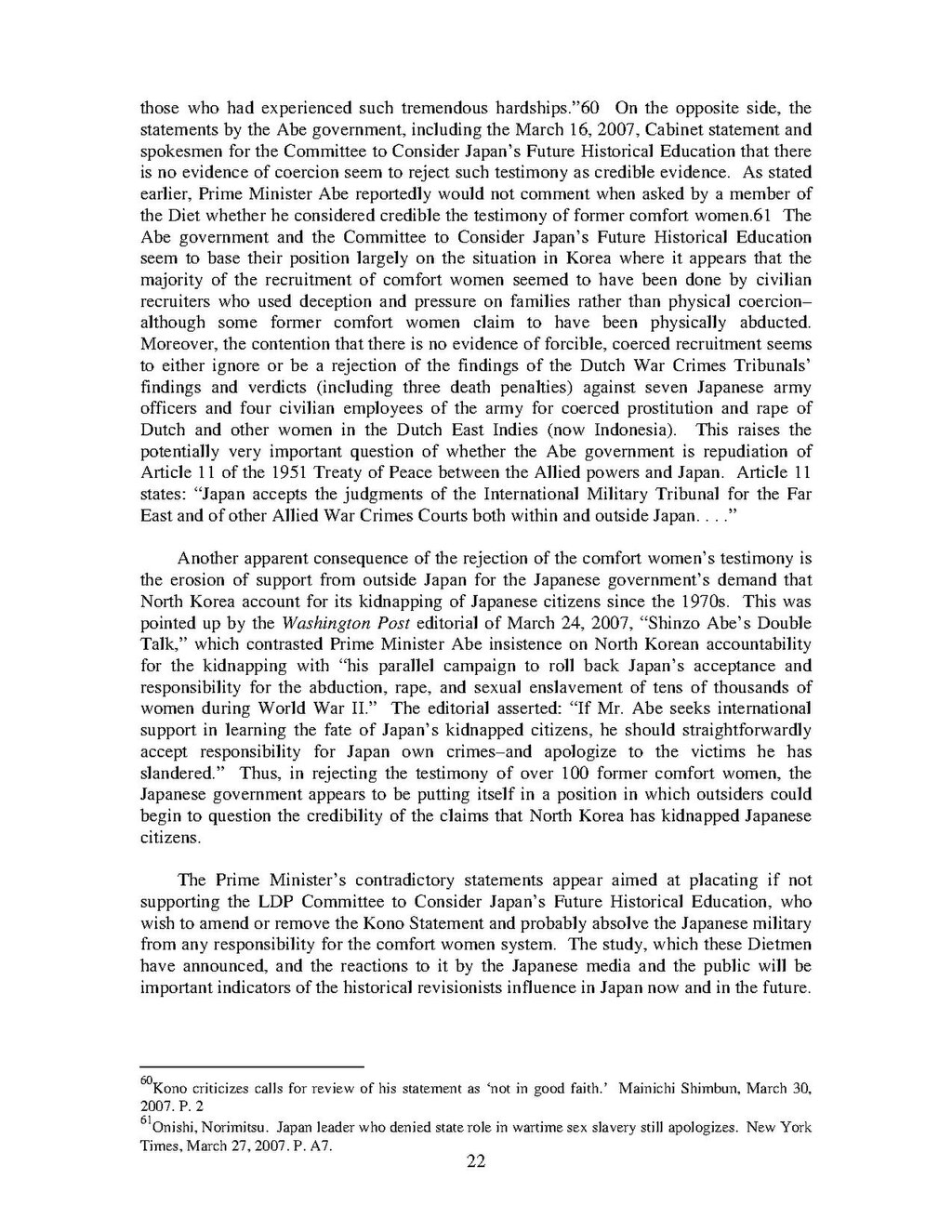those who had experienced such tremendous hardships.”[1] On the opposite side, the statements by the Abe government, including the March 16, 2007, Cabinet statement and spokesmen for the Committee to Consider Japan’s Future Historical Education that there is no evidence of coercion seem to reject such testimony as credible evidence. As stated earlier, Prime Minister Abe reportedly would not comment when asked by a member of the Diet whether he considered credible the testimony of former comfort women.[2] The Abe government and the Committee to Consider Japan’s Future Historical Education seem to base their position largely on the situation in Korea where it appears that the majority of the recruitment of comfort women seemed to have been done by civilian recruiters who used deception and pressure on families rather than physical coercion—although some former comfort women claim to have been physically abducted. Moreover, the contention that there is no evidence of forcible, coerced recruitment seems to either ignore or be a rejection of the findings of the Dutch War Crimes Tribunals’ findings and verdicts (including three death penalties) against seven Japanese army officers and four civilian employees of the army for coerced prostitution and rape of Dutch and other women in the Dutch East Indies (now Indonesia). This raises the potentially very important question of whether the Abe government is repudiation of Article 11 of the 1951 Treaty of Peace between the Allied powers and Japan. Article 11 states: “Japan accepts the judgments of the International Military Tribunal for the Far East and of other Allied War Crimes Courts both within and outside Japan. …”
Another apparent consequence of the rejection of the comfort women’s testimony is the erosion of support from outside Japan for the Japanese government’s demand that North Korea account for its kidnapping of Japanese citizens since the 1970s. This was pointed up by the Washington Post editorial of March 24, 2007, “Shinzo Abe’s Double Talk,” which contrasted Prime Minister Abe insistence on North Korean accountability for the kidnapping with “his parallel campaign to roll back Japan’s acceptance and responsibility for the abduction, rape, and sexual enslavement of tens of thousands of women during World War II.” The editorial asserted: “If Mr. Abe seeks international support in learning the fate of Japan’s kidnapped citizens, he should straightforwardly accept responsibility for Japan own crimes–and apologize to the victims he has slandered.” Thus, in rejecting the testimony of over 100 former comfort women, the Japanese government appears to be putting itself in a position in which outsiders could begin to question the credibility of the claims that North Korea has kidnapped Japanese citizens.
The Prime Minister’s contradictory statements appear aimed at placating if not supporting the LDP Committee to Consider Japan’s Future Historical Education, who wish to amend or remove the Kono Statement and probably absolve the Japanese military from any responsibility for the comfort women system. The study, which these Dietmen have announced, and the reactions to it by the Japanese media and the public will be important indicators of the historical revisionists influence in Japan now and in the future.
- ↑ Kono criticizes calls for review of his statement as ‘not in good faith.’ Mainichi Shimbun, March 30, 2007. P. 2
- ↑ Onishi, Norimitsu. Japan leader who denied state role in wartime sex slavery still apologizes. New York Times, March 27, 2007. P. A7.
22
